Exploring the Complex Relationship Between Addiction and Physical Health
Addiction significantly affects both the mind and body, creating profound changes that disrupt physical health. Understanding these impacts and exploring paths to repair and recovery are critical in helping individuals reclaim their lives. This article delves into how addiction affects physical health and presents pathways to healing, highlighting effective recovery strategies and the role of therapeutic and holistic approaches in overcoming substance use disorders.
The Extensive Physical Repercussions of Addiction
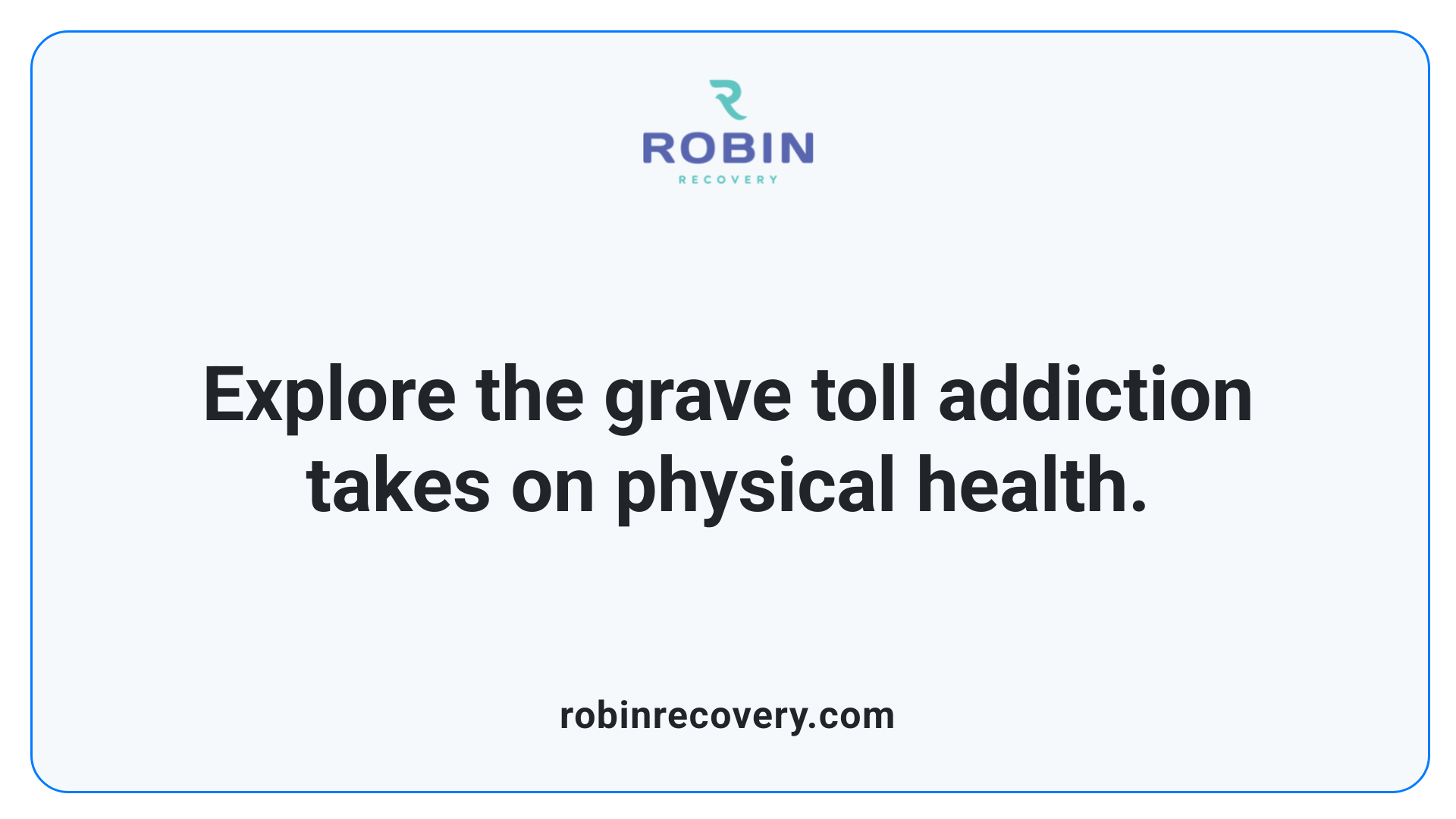
How does addiction affect physical health?
Addiction significantly affects physical health by contributing to a range of serious medical issues. These include lung and heart disease, stroke, various cancers, and infectious diseases such as HIV and hepatitis C. Long-term drug use can lead to damaging physical effects throughout the body, which can be observed through imaging scans, chest X-rays, and blood tests.
Addiction results in significant deterioration across multiple organ systems:
- Cardiovascular System: Drugs like cocaine and amphetamines can lead to irregular heart rates, hypertension, heart attacks, and even strokes. Chronic alcohol use can cause conditions like cardiomyopathy.
- Respiratory Health: Tobacco and other smoking substances are notorious for causing lung diseases, including chronic bronchitis and lung cancer, reducing respiratory capacity over time.
- Neurological Impact: Addiction alters brain function, reducing the ability to feel pleasure from healthy activities. This can lead to cognitive impairments, affecting memory and decision-making, and trigger severe mental health conditions such as anxiety and depression.
Moreover, specific substances are closely linked to certain diseases. Tobacco smoke contributes to various cancers, while methamphetamine use is associated with severe dental issues, emphasizing how addiction's consequences can manifest in specific health problems. The interaction between physical damage and mental health ramifications illustrates that comprehensive treatment approaches are essential for recovery.
The pervasive impact of addiction extends beyond the individual, affecting families and communities, and can lead to increased healthcare costs and loss of productivity, necessitating a multifaceted approach to treatment that addresses both physical and psychological needs.
Understanding the Science Behind Addiction
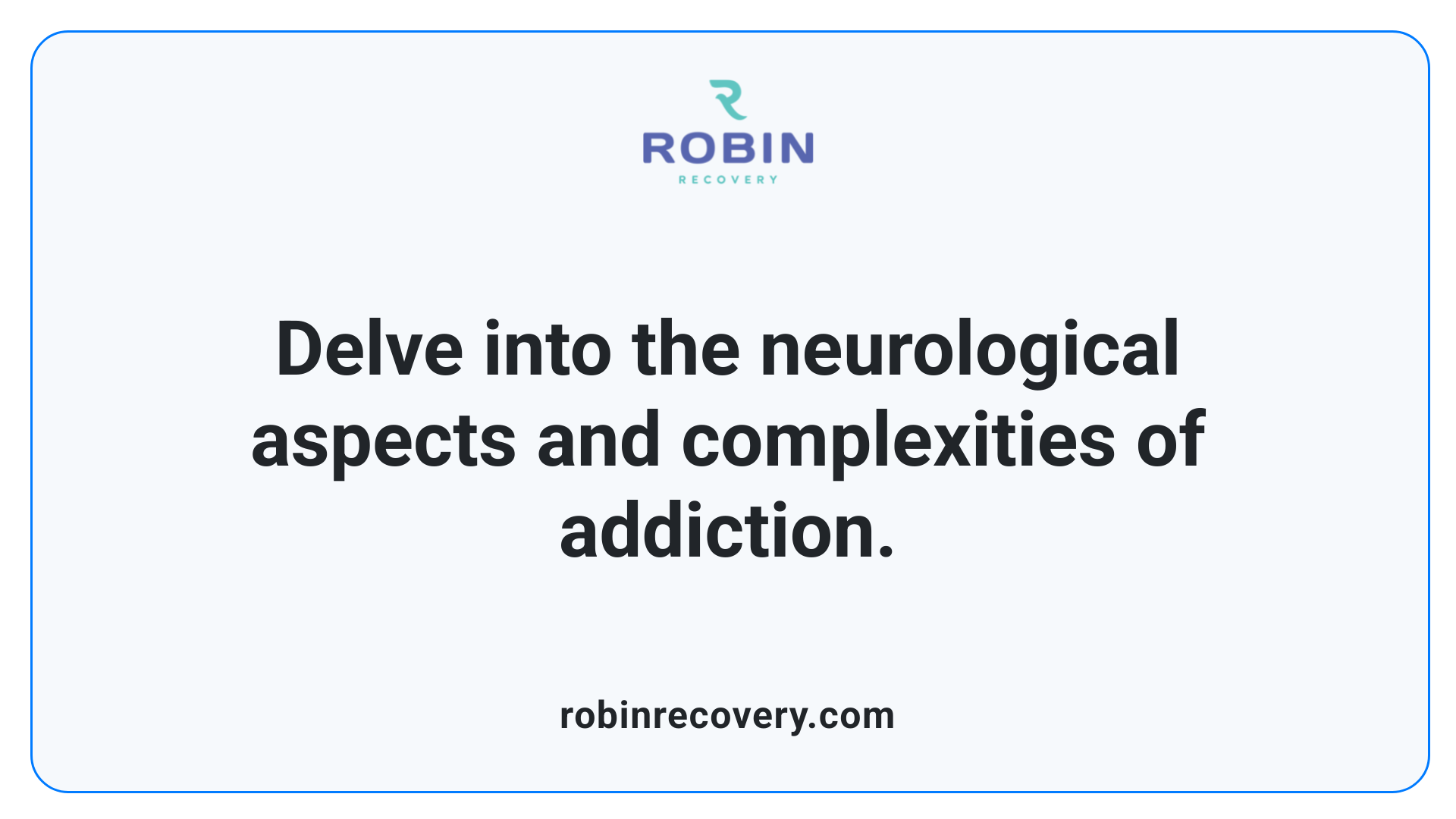
Neurological changes due to addiction
Addiction is fundamentally a brain disease. Substances alter the brain's chemistry, diminishing the capacity to experience pleasure from everyday activities. Repeated use leads to neuropsychological declines that can change one’s impulse control and diminish decision-making abilities. For example, this may manifest as cravings or withdrawal symptoms, reflecting the body's dependency on the substance for basic functioning.
Factors contributing to addiction
Numerous factors contribute to addiction, making it a multifaceted issue. Genetics play a role, with studies indicating a 40%-60% vulnerability to developing substance use disorders. Environmental influences, such as availability of substances and adverse childhood experiences, also significantly affect susceptibility. Mental health conditions like anxiety and depression can further exacerbate the risk, creating a complex interplay of vulnerabilities.
Complexity of addiction beyond willpower
The notion that addiction is merely a matter of willpower is a misconception. It is a chronic condition requiring comprehensive treatment strategies. Recovery often necessitates medical intervention alongside therapeutic support, as behavioral changes alone are insufficient to break the cycle. This complexity stresses the importance of understanding addiction not just as a choice but as a serious health issue that affects mental and physical well-being.
Symptoms and Long-term Health Risks of Substance Use Disorders
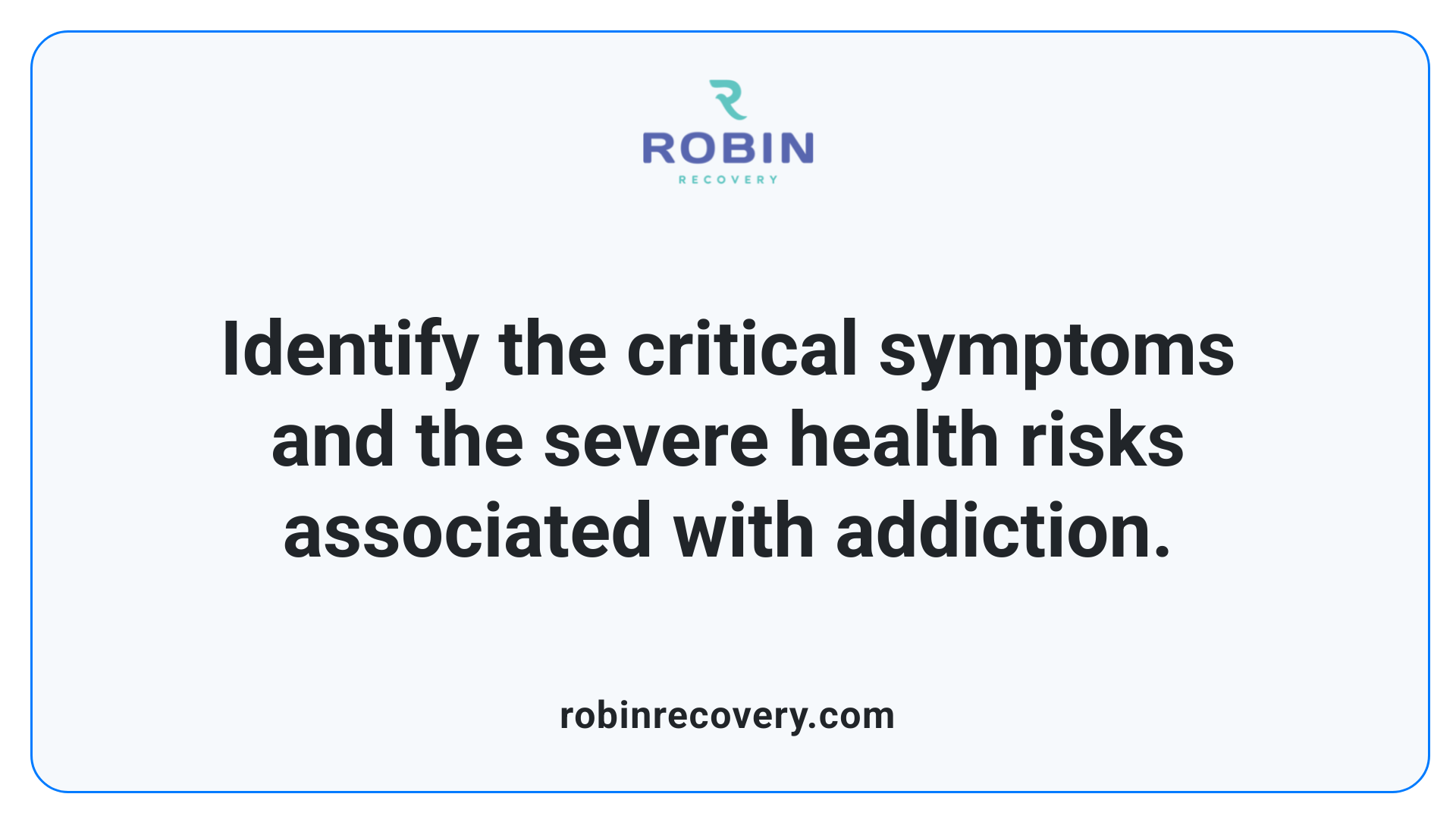
What are the symptoms of addiction?
Addiction often manifests through several symptoms that significantly affect daily life. Common indicators include:
- Inability to stop: A strong, compulsion to continue using substances despite knowing the risks.
- Increased tolerance: Needing higher amounts of the substance to achieve the same effects.
- Withdrawal symptoms: Experiencing physical or emotional distress when not using the substance.
- Intense focus: Preoccupation with acquiring and using the substance, leading to neglect of personal responsibilities.
What are the long-term health risks?
The long-term consequences of substance abuse are severe and can impact nearly every organ system, leading to:
- Cardiovascular problems: Increased risks of heart attacks, arrhythmias, and strokes due to drugs like cocaine and amphetamines.
- Liver damage: Long-term alcohol use can cause liver diseases such as cirrhosis, accounting for considerable morbidity.
- Respiratory issues: Smoking substances can lead to chronic bronchitis, lung cancer, and other significant lung diseases.
- Neurological impairments: Substance abuse may result in cognitive deficits and increased susceptibility to mental health disorders such as anxiety and depression.
How does substance abuse affect the immune system and organ health?
Substance use disorders can weaken the immune system, heightening susceptibility to infections. Additionally, chronic use negatively impacts organs such as:
- Kidneys: Risk of permanent damage or failure due to dehydration or drug toxicity.
- Gastrointestinal system: Long-term abuse can lead to severe complications like gastric ulcers and an increased risk of esophageal cancer.
Therapeutic Approaches in Managing Withdrawal and Recovery
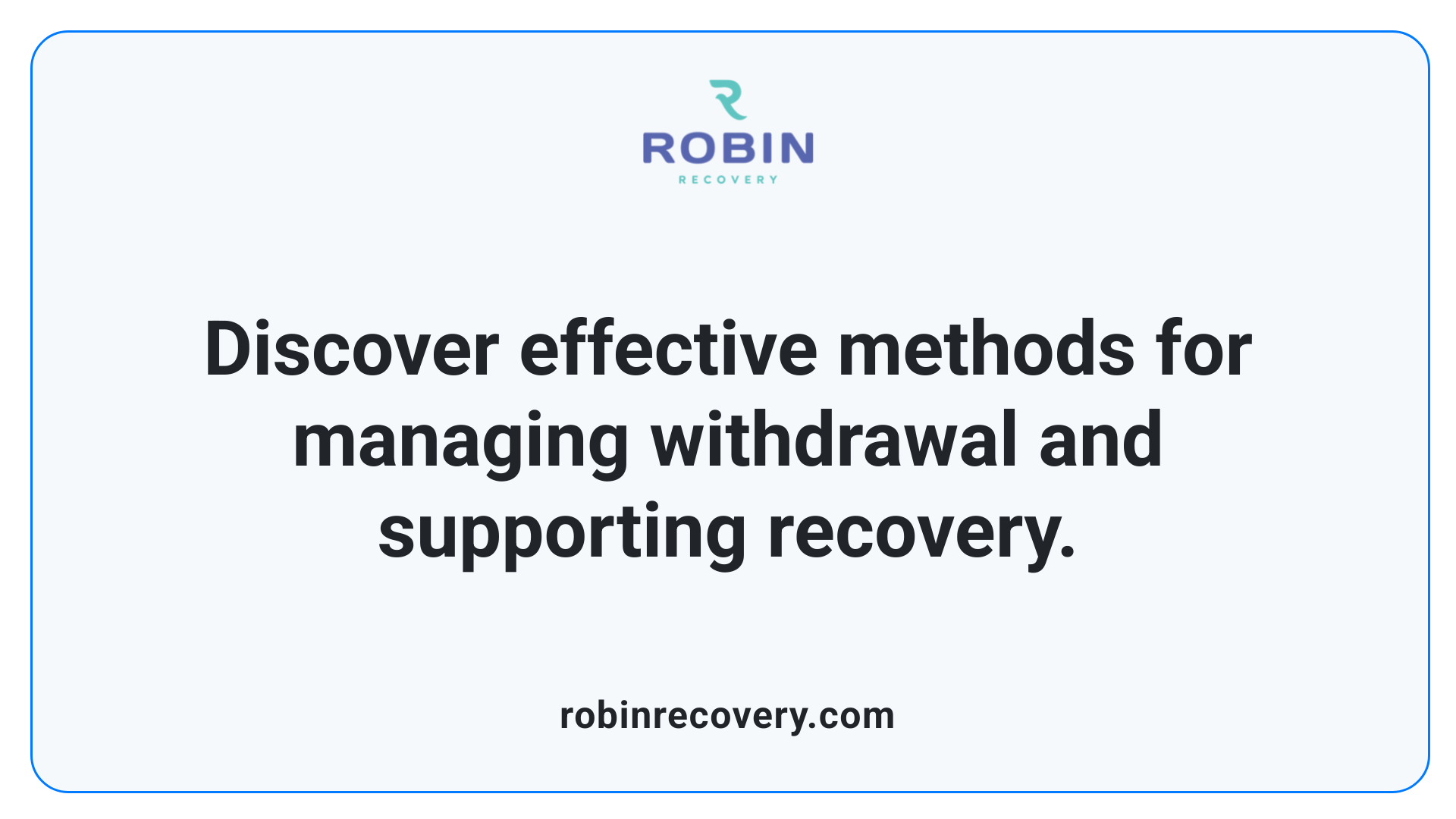
Withdrawal Symptoms and Management
Managing withdrawal symptoms is a critical aspect of treating substance use disorder (SUD). Symptoms can vary significantly depending on the substance involved, but common issues include anxiety, nausea, sweating, tremors, and intense cravings. These symptoms can make it difficult for individuals to remain drug-free without support. Effective management often involves a combination of medication and behavioral therapies to ensure individuals receive both medical and psychological support during this challenging time.
Role of Medication and Therapy
Medications can play an essential role in managing withdrawal symptoms and aiding recovery. For example, medications like Methadone and Buprenorphine help to alleviate cravings and withdrawal symptoms for opioid use disorder. Coupled with psychological support, these treatments can significantly improve recovery outcomes. Behavioral therapies, which are designed to change attitudes and behaviors related to drug use, further enhance the efficacy of medication by helping individuals learn healthier coping mechanisms.
Introduction to Behavioral Therapies
Behavioral therapies, such as cognitive behavioral therapy (CBT) and dialectical behavior therapy (DBT), are instrumental in helping individuals overcome addiction. These therapies focus on changing negative thought patterns and developing skills to manage cravings and avoid relapse. They empower individuals to approach recovery proactively, addressing both their mental health needs and the underlying issues contributing to their substance use.
Substance use disorder is a chronic condition with no definitive cure, but comprehensive treatment strategies can lead to long-term recovery and improved quality of life.
| Topic | Description | Importance |
|---|---|---|
| Withdrawal Symptoms | Symptoms vary by substance; management is crucial for recovery success. | To facilitate successful recovery. |
| Medications | Aid in managing cravings and withdrawal symptoms; used for various addictions. | Essential for stabilizing individuals during treatment. |
| Behavioral Therapies | Focus on changing unhealthy habits and thought patterns to support long-term recovery. | Key to addressing the psychological aspects of addiction. |
The Role of Physical Activity in Recovery
Benefits of Physical Activity
Engaging in regular physical activity significantly enhances recovery from addiction. It contributes to improved physical health, elevates mood, and helps manage stress. The release of endorphins during exercise fosters feelings of happiness and well-being. Additionally, physical activity encourages a healthier lifestyle, which can counteract the adverse effects of substance use on organ systems like the heart and lungs.
Reduction in Relapse Rates
Incorporating exercise into treatment plans is linked to reduced relapse rates. Regular physical activity helps individuals develop discipline and distracts them from cravings. Establishing a routine centered around fitness can also combat withdrawal symptoms and reduce anxiety, making it easier to maintain sobriety.
Social and Psychological Positives
Physical activity fosters social connections, providing opportunities to meet others in recovery. Group exercises and sports can create a support network that encourages accountability. These interactions improve social skills and reinforce positive social behaviors. Overall, exercise not only benefits physical health but also promotes mental resilience, making it a vital component of addiction recovery.
Building a Healthy Lifestyle Post-Addiction
Diet, hydration, and exercise in recovery
A balanced diet, adequate hydration, and regular exercise are essential components of recovery from substance use disorder. A nutritious diet can help repair damage caused by addiction, while hydration is vital for overall health. Engaging in physical activity promotes the release of endorphins, which improves mood and reduces stress, beneficial during recovery.
Creating supportive environments
Surrounding oneself with supportive friends and family members can significantly enhance the recovery experience. Creating environments that encourage healthy activities—like cooking healthy meals together or participating in group sports—can foster community and belonging, making the recovery process more manageable and less isolating.
Importance of integrating physical health therapy
Integrating physical health therapy into recovery programs is crucial for overall well-being. Therapies can include monitoring vital signs, promoting healthy eating, and encouraging exercise. These practices not only support physical health but also help individuals build confidence and self-esteem, aiding in their long-term recovery efforts.
| Element | Importance | Benefits |
|---|---|---|
| Diet | Repairs physical health | Improves nutrition and energy levels |
| Hydration | Maintains bodily functions | Enhances mood and cognitive function |
| Exercise | Releases endorphins, combats stress | Supports emotional health and fosters social connections |
| Supportive Environment | Encourages healthy habits and accountability | Reduces feelings of isolation and promotes community |
| Physical Health Therapy | Monitors health and promotes healthy choices | Increases recovery success and long-term well-being |
Managing Cravings and Emotional Triggers
What are some effective strategies for managing cravings during recovery?
Managing cravings effectively during recovery involves several behavioral strategies. It's crucial to understand that cravings come in waves and will eventually subside. Keeping a list of personal goals readily accessible can help reinforce the motivation to resist.
Being consistent with treatment and therapy is key, along with discovering new passions that can occupy the mind. Regular exercise not only helps alleviate cravings but also releases endorphins that improve overall mood. Practicing meditation or breathing techniques can also provide a calming effect during intense cravings.
Support systems play a vital role in navigating these challenging moments. Having a trusted person to talk to can reduce feelings of isolation and increase accountability.
How can one overcome addiction through alternative activities?
Engaging in alternative activities is an effective way to combat cravings. Simple actions like going for a walk, calling a friend, or volunteering can shift attention away from the urge to use substances.
Setting a meaningful quit date can act as a personal commitment, further motivating the recovery journey. It’s also beneficial to alter your surroundings, eliminating any reminders of substance use and distancing yourself from negative influences.
Reflecting on past attempts to quit offers insights on what strategies are effective and which pitfalls to avoid. Building a support network of family, friends, and health professionals can provide the encouragement needed to stay on track, reinforcing a commitment to health and sobriety.
| Strategies | Description | Benefits |
|---|---|---|
| Understand Cravings | Recognize that cravings are temporary and will pass. | Reduces anxiety around cravings. |
| Identify Goals | Keep personal recovery goals visible. | Enhances motivation and focus. |
| Engage in Exercise | Participate in physical activities regularly. | Boosts mood and reduces cravings. |
| Utilize Support Systems | Talk to trusted friends or support groups. | Provides companionship and accountability. |
| Alternative Activities | Participate in hobbies or volunteer work. | Diverts attention away from substance urges. |
| Environment Modification | Remove reminders of addiction and reduce exposure to triggers. | Lowers temptation and risk of relapse. |
The Importance of Holistic Health Approaches
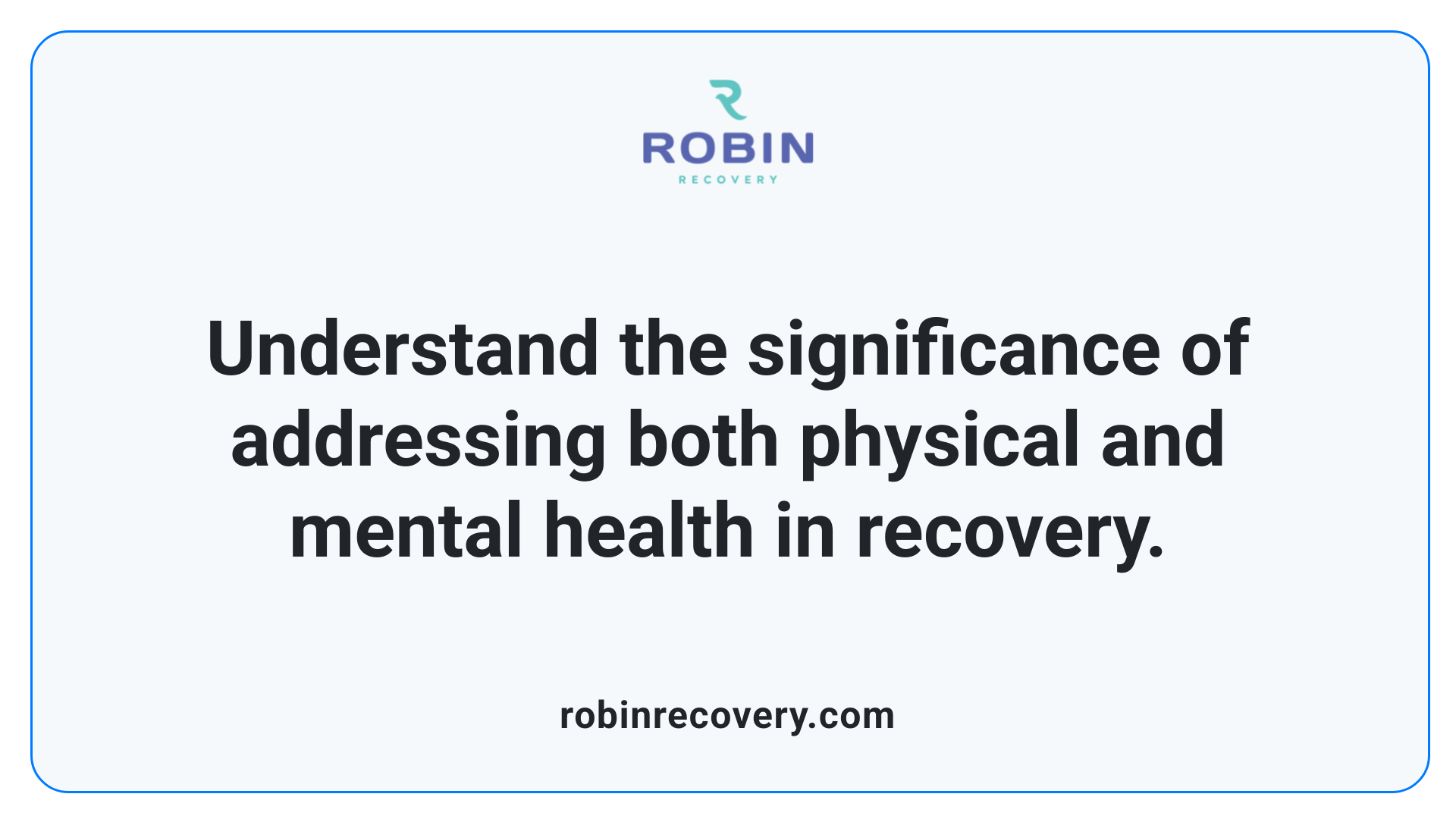
Integration of physical and mental health in recovery
Recovery from addiction necessitates addressing both physical and mental health needs. Many treatment programs now recognize that substance use disorders (SUD) are intertwined with psychological conditions like anxiety and depression. This dual approach helps cater to the comprehensive needs of individuals, enhancing the potential for lasting recovery.
Importance of social and community support
Building a supportive community is another critical aspect of the recovery journey. Relationships foster resilience against relapse, as social interactions can bolster emotional health. Support groups provide a platform for shared experiences, making individuals feel less isolated and more understood.
Role of self-care and mindfulness
Incorporating self-care practices, such as mindfulness and healthy living habits, into recovery strategies can significantly improve outcomes. Engaging in physical activities and establishing nutritional routines enhances individuals’ overall well-being, aiding their journey to sobriety. This aspect emphasizes that recovery is not solely about abstaining from substances but also about cultivating a healthier lifestyle.
Navigating the Path to Recovery: Success Stories and Challenges
What are the health consequences of addiction?
Addiction is a chronic condition that can lead to severe physical and mental health issues. Individuals suffering from substance use disorders (SUDs) often experience long-term consequences that affect various body systems. Chronic drug use can result in cardiovascular problems like arrhythmias and heart attacks due to increased stress on the heart. Additionally, substances like alcohol are notorious for causing liver diseases, including cirrhosis, while opioids can lead to respiratory difficulties.
How does addiction affect mental health?
Mental health plays a pivotal role in addiction, with conditions such as anxiety and depression often exacerbated by substance use. Cognitive deficits, including problems with decision-making and memory, can emerge, complicating the recovery process. Indeed, frequent drug misuse alters brain function, reducing the ability to enjoy healthy activities, which can lead to a vicious cycle of dependence.
What role does physical health play in recovery?
Physical health is paramount in the recovery process from addiction. Engaging in physical activity not only aids in improving physical health but also supports mental wellness, helping to manage cravings and promote a sense of community among those in recovery. Losing weight, adopting a nutritious diet, and staying active can lead to significant health improvements post-recovery.
Overview of health impacts due to substance use
| Health Impact | Alcohol | Opioids | Nicotine |
|---|---|---|---|
| Cardiovascular Issues | Heart disease | Increased heart attack risk | High blood pressure |
| Liver Damage | Cirrhosis | — | — |
| Respiratory Problems | — | Respiratory depression | Chronic bronchitis |
| Neurological Effects | Cognitive decline | Brain function impairment | Learning issues |
| Mental Health Issues | Anxiety | Depression | Stress |
A New Beginning: Embracing Recovery and Well-being
Healing from addiction is a formidable journey that requires courage, dedication, and the right mix of treatment and support. By understanding the severe physical impacts of addiction and embracing comprehensive recovery methodologies, individuals can reclaim their lives. Fostering a healthy lifestyle, engaging in physical activity, and maintaining strong support networks are vital in sustaining recovery and improving overall well-being. It is crucial for individuals, families, and communities to unite in spreading knowledge, reducing stigma, and providing the necessary resources to guide people towards recovery and health resilience.
References
- Addiction and Health | National Institute on Drug Abuse (NIDA)
- Physical & Mental Effects of Drug Abuse - Gateway Foundation
- Addiction: What It Is, Causes, Symptoms, Types & Treatment
- Physical and mental effects of drug abuse - Medical News Today
- Physical activity during a treatment for substance use disorder
- Health Risks of Substance Abuse - American Addiction Centers
- How drugs affect your body | Better Health Channel
- Drug addiction (substance use disorder) - Symptoms and causes
- Substance Use Disorder (SUD): Symptoms & Treatment
- The Impact of Addiction on Physical Health - Harris House
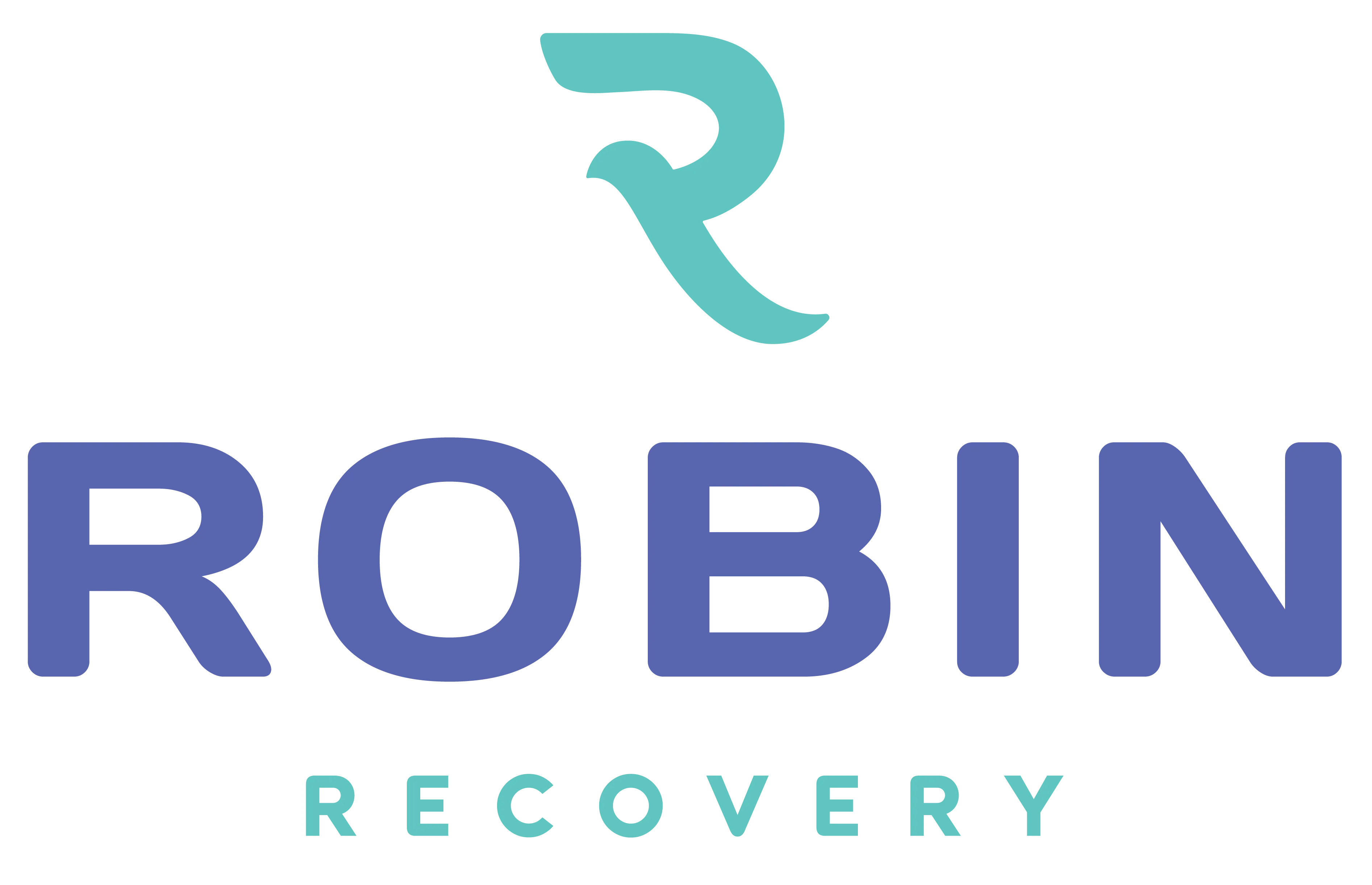
.svg)

.svg)

.svg)
.svg)






































































































